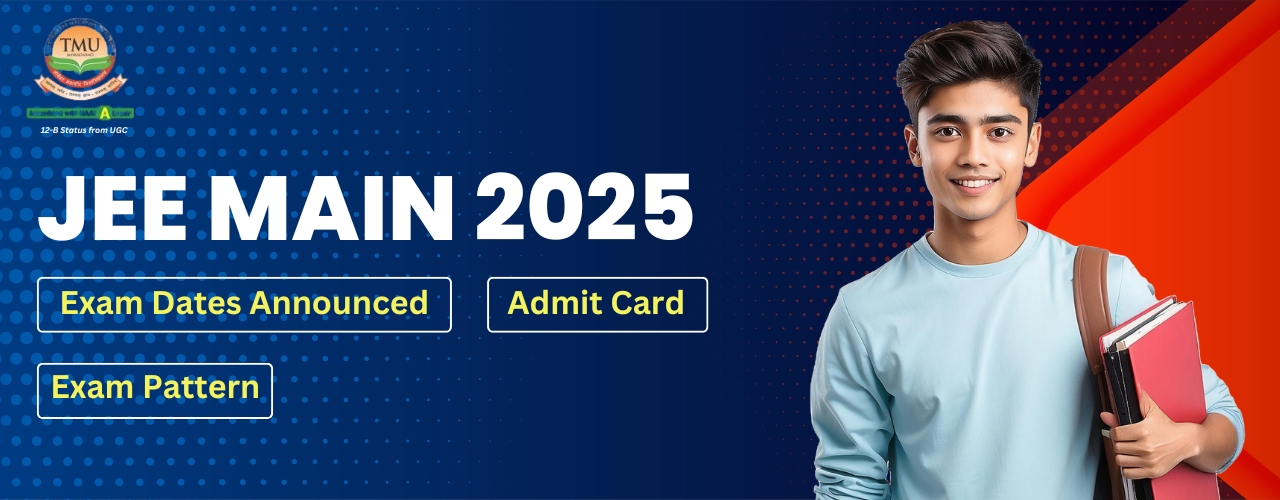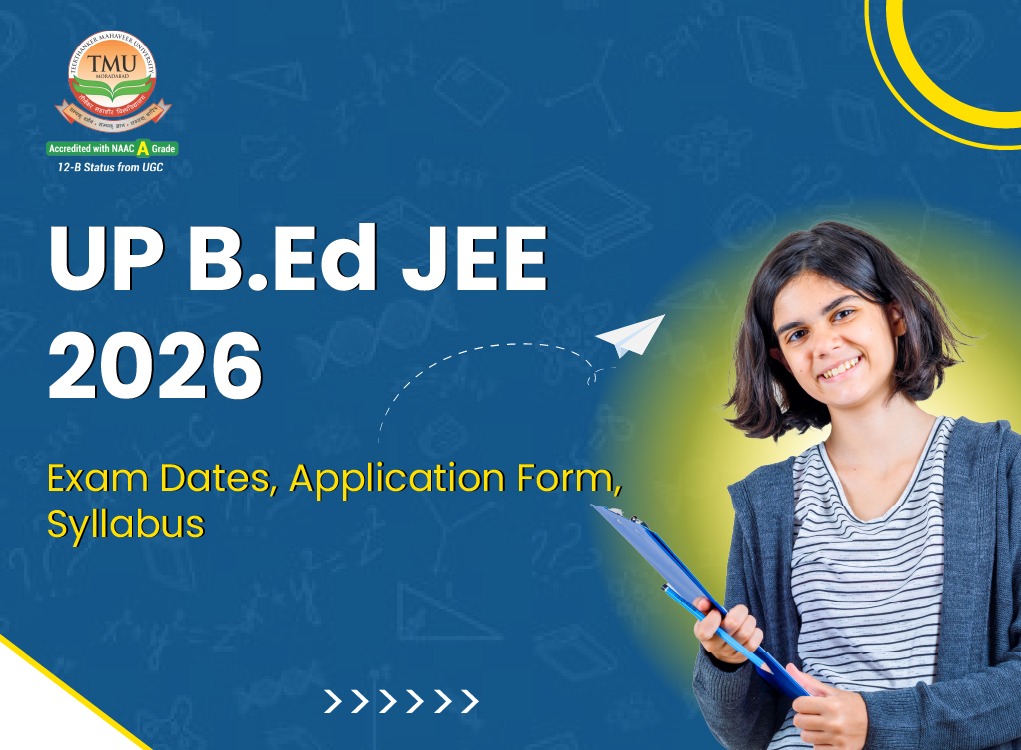JEE Main 2025: Exam Dates Announced, Admit Card and Exam Pattern
Table of Contents
JEE Main stands for Joint Entrance Examination - Main. It is a national-level engineering entrance examination conducted by India's National Testing Agency (NTA).
Purpose of JEE Main:
- Admission to Premier Institutes: JEE Main serves as the gateway for admission to undergraduate engineering and architecture programs in prestigious institutions like:
- National Institutes of Technology (NITs)
- Indian Institutes of Information Technology (IIITs)
- Other Government Funded Technical Institutes (GFTIs)
- Eligibility for JEE Advanced: JEE Main also acts as a qualifying exam for JEE Advanced, the entrance exam for admission to the Indian Institutes of Technology (IITs).
JEE Main 2025 Latest Updates
Here are the most recent updates regarding the JEE Main 2025 exam:
JEE Main 2025 Session 1 Exam Dates: Announced.
- Paper 1 (B.E./B.Tech): January 22, 23, 24, 28, and 29
- Paper 2 (B.Arch/B.Plan): January 30
Session 2: April 1 to April 8, 2025.
Registration Details
- Session 1:
- Registration window: Closed on November 22, 2024.
- Correction window: November 26–27, 2024.
- Session 2:
- Registration opens: on January 31, 2025.
- Registration closes: on February 24, 2025.
Teerthanker Mahaveer University
Apply for Admission
Click Here To Apply for Admission
JEE Main Exam Dates
The JEE Main 2025 exam will be conducted in two sessions. Below are the detailed schedules for both sessions:
| Session | Paper | Exam Dates |
| Session 1 | Paper 1 (B.E./B.Tech) | January 22, 23, 24, 28, 29 |
| Session 1 | Paper 2 (B.Arch/B.Plan) | January 30 |
| Session 2 | Paper 1 & 2 | April 1 - 8 (Tentative) |
Please Note: These are the officially announced dates for Session 1. The exact dates for Session 2 will be announced later.
You can find the most up-to-date information on the official JEE Main website: jeemain.nta.nic.in
JEE Main Correction Window
The JEE Main 2025 correction window for Session 1 was open from November 26 to 27, 2024.
- Candidates could edit certain details in their application forms during this period.
- The correction window for Session 2 will be announced separately at a later date.
For the most accurate and up-to-date information, please refer to the official JEE Main website: JEE Main
JEE Main Admit Card
The JEE Main 2025 Session 1 admit cards are expected to be released on January 19, 2025.
- You can download them from the official website (jeemain.nta.nic.in) using your application number and password.
Key Points:
- Admit Card Importance: The admit card is an essential document. You must carry it to the exam centre along with a valid photo ID.
- Exam Date: The JEE Main 2025 Session 1 exams will be held from January 22 to 29, 2025.
For the most accurate and up-to-date information, always refer to the official JEE Main website: JEE Main
JEE Main Syllabus
The JEE Main 2025 syllabus is quite extensive, covering a wide range of topics in Physics, Chemistry, and Mathematics. Here's a brief overview:
| Subject | Topics |
| Physics | Covers core concepts like mechanics, thermodynamics, electromagnetism, optics, and modern physics. |
| Chemistry | Includes physical, inorganic, and organic chemistry, encompassing topics like atomic structure, chemical bonding, thermodynamics, solutions, equilibrium, and organic reactions. |
| Mathematics | Focuses on algebra, calculus, coordinate geometry, trigonometry, vectors, and statistics. |
For the complete and detailed syllabus, refer to the official NTA website.
Note: The syllabus can have minor changes, so always check the official source for the most accurate information.
JEE Main Exam Pattern
The JEE Main 2025 examination has undergone significant changes in its pattern, as announced by the National Testing Agency (NTA). Here's a detailed overview of the revised exam structure:
Exam Pattern Overview
The JEE Main 2025 exam is divided into three papers:
- Paper 1: For B.E./B.Tech aspirants.
- Paper 2A: For B.Arch aspirants.
- Paper 2B: For B.Planning aspirants.
Here’s a comprehensive breakdown of the exam pattern for all three papers:
| Paper | Subjects | Total Questions | Question Distribution | Marking Scheme | Duration | Mode |
| Paper 1: B.E./B.Tech | Mathematics, Physics, Chemistry | 75 (25 per subject) | - Section A: 20 MCQs - Section B: 5 NVQs (Mandatory) | - Correct: +4 - Incorrect: -1 - Unanswered: 0 | 3 Hours | Computer-Based Test |
| Paper 2A: B.Arch | Mathematics, Aptitude, Drawing | 77 | - Mathematics: 25 (20 MCQs + 5 NVQs) - Aptitude: 50 MCQs - Drawing: 2 Questions | - Mathematics & Aptitude: Correct: +4, Incorrect: -1 - Drawing: Marked out of 100 | 3 Hours | CBT (Drawing on paper) |
| Paper 2B: B.Planning | Mathematics, Aptitude, Planning | 100 | - Mathematics: 25 (20 MCQs + 5 NVQs) - Aptitude: 50 MCQs - Planning: 25 MCQs | - Correct: +4 - Incorrect: -1 - Unanswered: 0 | 3 Hours | Computer-Based Test |
Key Features of JEE Main 2025 Exam Pattern
- Negative Marking:
- Negative marking is applicable for both MCQs and Numerical Value Questions (NVQs) in all sections.
- Mandatory Numerical Value Questions:
- All questions in Section B (Numerical Value Questions) are compulsory.
- Tie-Breaking Policy:
- In case of a tie, priority will be given to candidates with higher scores in:
- Mathematics → Physics → Chemistry.
- A lower ratio of incorrect to correct responses will also be considered.
- In case of a tie, priority will be given to candidates with higher scores in:
- Exam Mode:
- Computer-Based Test (CBT) for all sections except the Drawing Test in Paper 2A, which remains pen-and-paper based.
- Languages Available:
- The exam will be conducted in 13 languages, including English, Hindi, Gujarati, Assamese, Bengali, Kannada, Malayalam, Marathi, Odia, Punjabi, Tamil, Telugu, and Urdu.
Important Changes in JEE Main 2025
- Optional questions in Section B have been removed, making all questions mandatory.
- Both MCQs and NVQs now carry negative markings, adding an extra layer of challenge.
JEE Main Marking Scheme
JEE Main 2025 Marking Scheme
- Multiple-Choice Questions (MCQs):
- Correct Answer: +4 marks
- Incorrect Answer: -1 mark
- Numerical Value Questions (NVQs):
- Correct Answer: +4 marks
- Incorrect Answer: -1 mark (No negative marking)
Note:
- This marking scheme applies to both Paper 1 (B.E./B.Tech) and Paper 2 (B.Arch/B.Plan).
- The Drawing section in Paper 2A (B.Arch) is evaluated separately.
For the most accurate and up-to-date information, always refer to the official JEE Main website: JEE Main
JEE Main 2025 City Intimation Slip
The JEE Main city intimation slip is a pre-admit card document issued by the National Testing Agency (NTA).It provides candidates with information about the city where their examination center is situated. This slip helps candidates plan their travel and accommodations, ensuring a hassle-free experience on the exam day.
Key Features of the City Intimation Slip
- City Name: The slip mentions the name of the city where the exam center is situated.
- Exam Session: It confirms the session (morning or afternoon) allotted to the candidate.
- Advance Information: Unlike the admit card, it does not provide the exact address of the exam center but gives candidates a heads-up about their exam location.
Release Date of the JEE Main 2025 City Intimation Slip
The city intimation slip is generally released a few weeks before the exam. For JEE Main 2025, candidates can expect the city intimation slip to be issued approximately 10-15 days before the examination date.
How to Download the JEE Main 2025 City Intimation Slip
Here are the steps to download your city intimation slip:
- Visit the official NTA JEE Main website: Official Website .
- Select the option for the city intimation slip from the available links.
- Log in using your application number and date of birth/password.
- Your city intimation slip will be displayed on the screen.
- Download and take a printout for future reference.
Details to Check on the City Intimation Slip
Once you download the slip, ensure all the details are correct:
- Name of the candidate
- Application number
- Exam session
- Exam City
If you notice any discrepancies, contact the NTA helpline immediately for assistance.
Importance of the City Intimation Slip
The city intimation slip is crucial for the following reasons:
- Travel Planning: Candidates can arrange their travel and accommodations in advance.
- Stress Reduction: Knowing the city beforehand reduces last-minute confusion and anxiety.
- Time Management: Candidates can better plan their journey and reach the exam center on time.
What After the City Intimation Slip?
After the release of the city intimation slip, the NTA will issue the JEE Main 2025 admit card, typically a week before the exam. The admit card will include the detailed address of the exam center, reporting time, and other essential instructions.
JEE Main vs Advanced Differences
The Joint Entrance Examination (JEE) is a two-stage entrance exam for admission into prestigious engineering colleges in India. JEE Main and JEE Advanced are the two parts of this examination, and understanding their differences is crucial for aspirants.
Here's a table summarizing the key differences between JEE Main and JEE Advanced:
| Feature | JEE Main | JEE Advanced |
| Purpose | Gateway to NITs, IIITs, and other GFTIs | Gateway to Indian Institutes of Technology (IITs) |
| Conducting Body | National Testing Agency (NTA) | Rotated among IITs (e.g., IIT Guwahati in 2024) |
| Eligibility | Pass Class 12 with Physics, Chemistry, and Mathematics | Qualify JEE Main and meet specific criteria |
| Exam Pattern | Multiple-choice questions (MCQs) and Numerical Value Questions (NVQs) | More complex MCQs, integer type, and multiple-correct-answer type questions |
| Difficulty Level | Moderate | Highly challenging |
| Syllabus | Covers core topics of Physics, Chemistry, and Mathematics | A broader syllabus may include advanced topics |
| Number of Attempts | Multiple attempts allowed | Typically 2 attempts in consecutive years |
| Focus | Conceptual understanding and problem-solving skills | Deeper conceptual understanding, analytical and problem-solving abilities, and critical thinking |
In essence:
- JEE Main is a more accessible exam that serves as a qualifying step for JEE Advanced and offers admission to a wide range of engineering institutions.
- JEE Advanced is significantly more difficult and selective, focusing on identifying the most talented and dedicated engineering aspirants for admission to the prestigious IITs.
Key Points:
- Both exams require dedicated preparation and a strong foundation in Physics, Chemistry, and Mathematics.
- JEE Advanced necessitates a deeper understanding of concepts and a higher level of problem-solving skills.
- While JEE Main is essential for aspiring engineers, JEE Advanced is crucial for those aiming for the IITs.
JEE Main Preparation Tips
- Foundational Understanding:
- Thorough Syllabus Coverage: Ensure you understand all core concepts in Physics, Chemistry, and Mathematics.
- NCERT Mastery: For Chemistry, NCERT textbooks are crucial. Understand concepts and practice problems.
- Consistent Practice:
- Regular Study: Dedicate consistent study hours daily or weekly, maintaining a structured routine.
- Problem-Solving: Practice a variety of problems from textbooks, previous year's papers, and mock tests.
- Numerical Focus: Pay special attention to numerical problems as they constitute a significant portion of the exam.
- Time Management:
- Mock Tests: Regularly take timed mock tests to simulate exam conditions and improve time management skills.
- Analyze Performance: After each mock test, analyze your performance, identify weak areas, and focus on improvement.
- Revision and Conceptual Clarity:
- Regular Revision: Periodically revise key concepts and formulas to reinforce learning.
- Concept Clarity: Don't just memorize; strive to understand the underlying principles of each topic.
- Stay Updated:
- Official Website: Regularly check the official NTA website for the latest information on syllabus, exam dates, and notifications.
- Health and Well-being:
- Balanced Diet: Eat nutritious food to maintain focus and energy levels.
- Physical Activity: Engage in regular exercise or physical activity to reduce stress and improve concentration.
- Adequate Sleep: Ensure sufficient sleep to maintain alertness and cognitive function.
- Seek Guidance:
- Coaching: Consider joining coaching classes for structured guidance and expert advice.
- Mentorship: Seek guidance from teachers, mentors, or seniors who have successfully cleared JEE Main.
- Stay Motivated:
- Set Realistic Goals: Set achievable short-term and long-term goals to stay motivated.
- Positive Mindset: Maintain a positive attitude and believe in your abilities.
- Stay Focused: Avoid distractions and maintain a focused approach throughout your preparation.
Remember: Consistent effort, dedication, and a well-structured approach are key to success in JEE Main.
Why choose Teerthanker Mahaveer University after JEE Mains?
Teerthanker Mahaveer University (TMU) offers a well-rounded choice for students after JEE Mains due to its affordable fees, excellent academic environment, and industry-driven curriculum. Here’s why TMU stands out:
- Quality Education at Affordable Fees: TMU offers engineering courses with 40% lower fees than most colleges in Uttar Pradesh, ensuring quality education without financial burden.
- State-of-the-Art Infrastructure: The university boasts modern labs, advanced research facilities, and well-equipped classrooms, providing students with hands-on learning opportunities.
- Experienced Faculty and Specialisations: TMU’s faculty members are experts in their respective fields, offering in-demand specialisations such as Artificial Intelligence, Data Science, and Electronics & Communication Engineering.
- Strong Placement Support: The university’s Corporate Resource Centre (CRC) ensures robust placement assistance, with tie-ups with leading companies for internships and job opportunities.
- Rankings and Recognition: TMU’s engineering programmes are ranked among the top in the region, reflecting its commitment to academic excellence.
- Comprehensive Personality Development: TMU focuses on holistic development through skill enhancement, leadership training, and extracurricular activities, preparing students for a competitive global environment.
By choosing TMU after JEE Mains, students gain access to affordable education, top-notch facilities, and excellent career opportunities, ensuring a successful and fulfilling engineering journey.
Conclusion
The JEE Main exam is a crucial gateway for aspiring engineers in India. By understanding the exam format, syllabus, and important dates, you can develop a comprehensive preparation strategy. This guide has provided you with a thorough overview of everything you need to know about the JEE Main 2025 exam, including the latest updates, admit card details, exam pattern, marking scheme, and valuable preparation tips.
Frequently Asked Questions (FAQs)
Q1: What is the rank of 90% in JEE Mains?
Ans: A 90 percentile in JEE Mains typically translates to a rank between 1,00,000 and 1,50,000. This rank can secure admission to several NITs, IIITs, and other prestigious engineering colleges.
Q2: Is 77 a good score in JEE Mains?
Ans: A score of 77 in JEE Mains is generally considered average. It might be sufficient for admission to some lower-ranked NITs or other participating institutes, but securing a seat in top-tier institutions with this score would be challenging.
Q3: Is 120 a bad score in JEE Mains?
Ans: No, 120 is a good score in JEE Mains. It typically translates to a high percentile, likely above 95, increasing your chances of admission to top NITs, IIITs, and other prestigious institutions.
Q4: Is the JEE Mains 2025 registration started?
Ans: JEE Main 2025 Session 1 registration has already closed. Registration for Session 2 will open on January 31, 2025.















